Key takeaways:
- Tour life involves a blend of exhilaration and fatigue, requiring adaptability and self-care for personal well-being.
- Key challenges include fatigue, emotional isolation, meal planning, and managing logistic uncertainties.
- Essential skills for touring are multitasking, clear communication, and effective time management to handle diverse demands.
- Building genuine relationships relies on trust, vulnerability, and shared experiences, which enhance camaraderie and support.
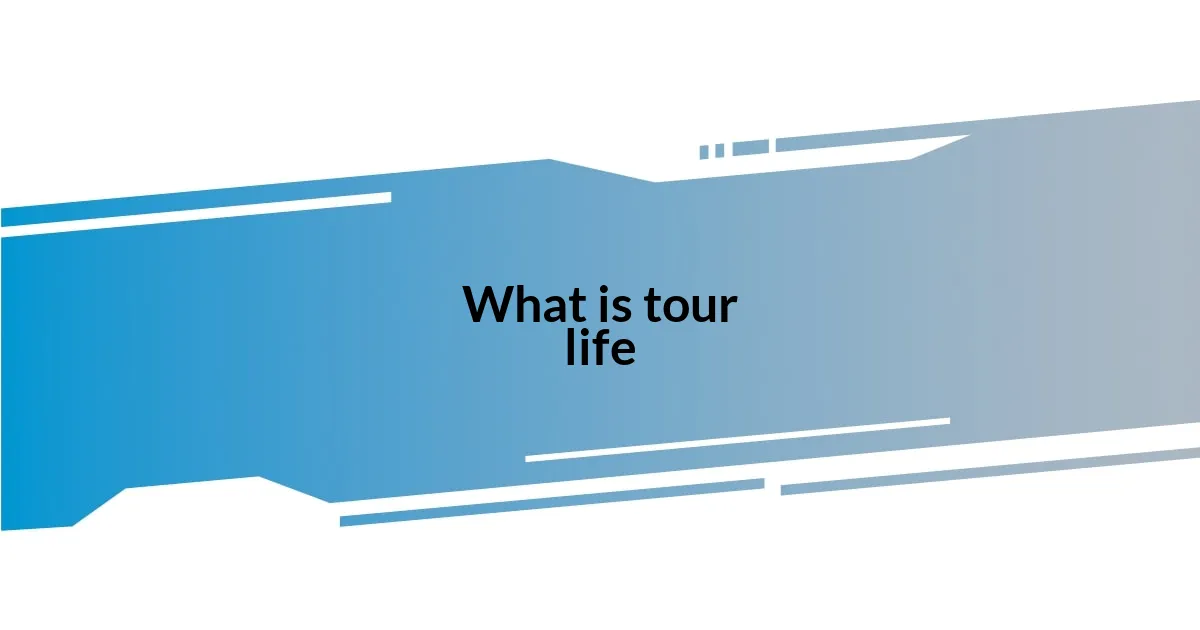
What is tour life
Tour life is a whirlwind of experiences, often characterized by constant movement and new environments. I remember my first tour; the excitement was palpable, yet I quickly discovered the toll it could take on my body and mind. Have you ever felt exhilarated and exhausted at the same time? It’s a unique blend that becomes your daily rhythm.
The camaraderie on the road is something that sticks with you. I recall late-night jam sessions in the green room, where laughter and music blended seamlessly into the early hours. Those moments forged bonds that felt like family; have you ever felt so connected to someone after just a few days? The shared highs and lows create a sense of unity that is truly special.
Logistics, however, can be a constant source of stress. The need to juggle schedules, travel arrangements, and accommodations often left me wondering about the balance between performance and rest. Have you ever struggled to maintain a sense of normalcy in an ever-changing environment? It’s all part of the journey, and through it, I’ve learned the importance of adaptability and self-care in maintaining not just performance, but personal well-being.
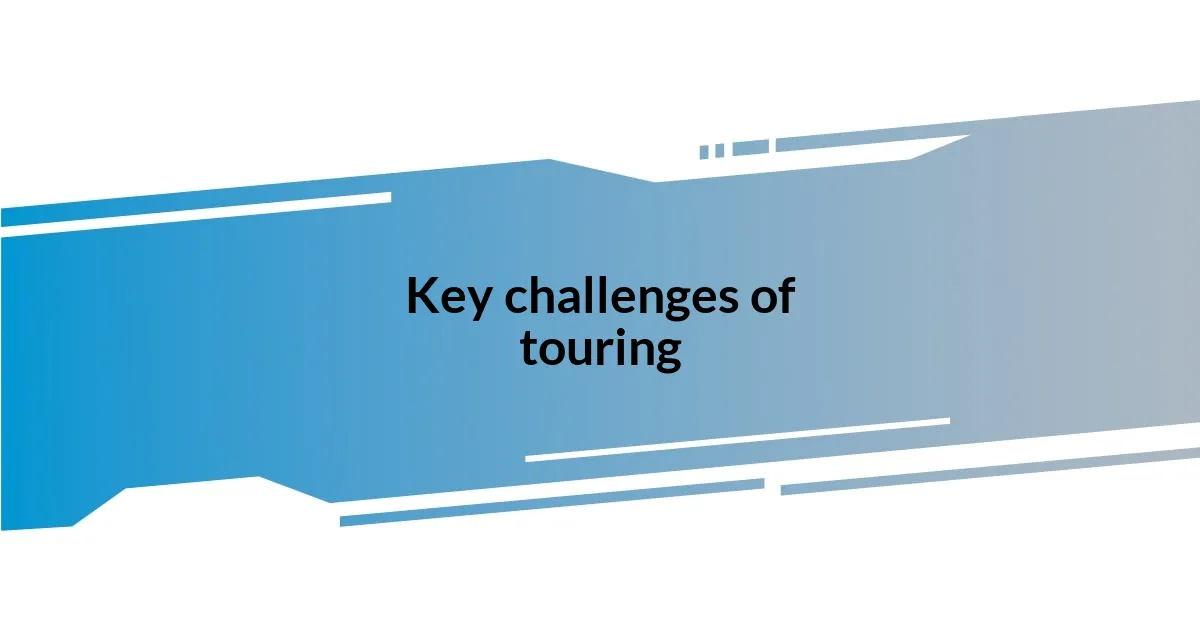
Key challenges of touring
The challenges of touring are often underestimated, but they can really shape your experience. One of the biggest hurdles I faced was the unpredictability of travel. I recall a time when our tour bus broke down in the middle of nowhere. We were stranded for hours, and instead of the anticipated rehearsal, we ended up sitting in a diner, swapping stories and queuing up music on our phones. In that moment, I learned that flexibility is crucial.
Here are some key challenges I encountered while on tour:
- Fatigue: Late nights and early mornings can wear you down quickly.
- Constant Change: Adaptation becomes a daily task, whether it’s adjusting to new venues or fluctuating schedules.
- Meal Planning: Finding healthy food options on the road is a real struggle. Trust me, those gas station snacks don’t cut it.
- Emotional Toll: Being away from home can lead to feelings of isolation, even when surrounded by your bandmates.
- Technical Issues: Gear failures or venue mishaps can turn a perfect show into a stressful scramble.
Navigating these challenges requires not just resilience, but also a deep appreciation for the little victories along the way.
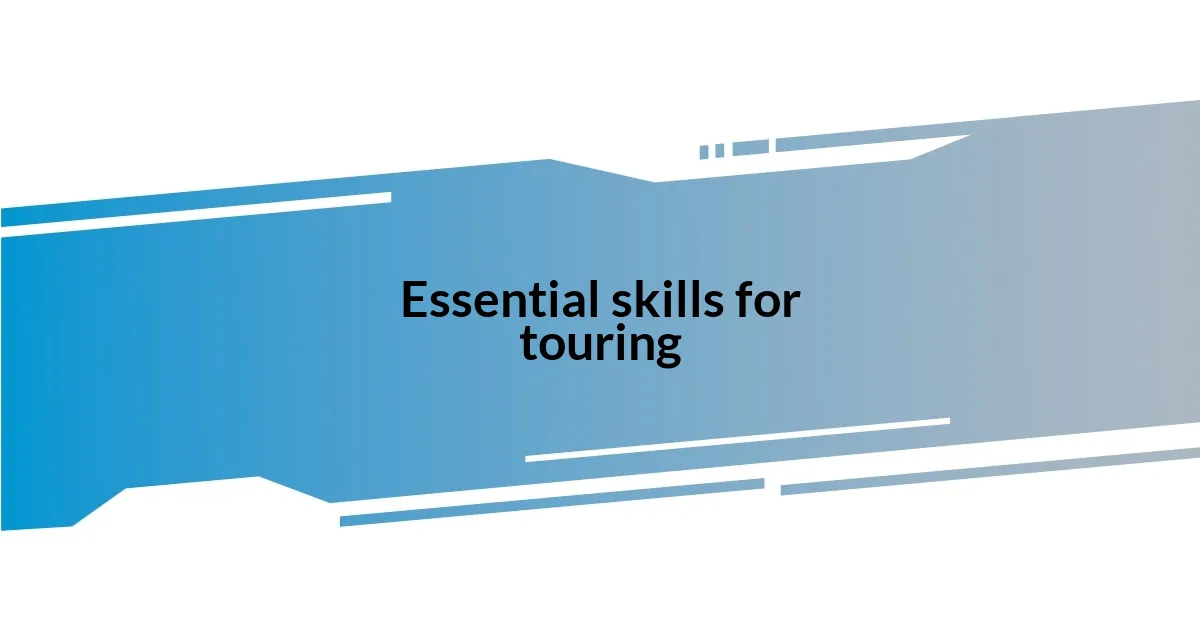
Essential skills for touring
When it comes to touring, I’ve learned that multitasking is not just a bonus skill; it’s essential. For instance, I remember having to set up my gear while also engaging with fans before a show. Juggling those tasks taught me to prioritize effectively and think quickly on my feet. Have you ever had to wear multiple hats at once? It seems daunting at first, but it’s incredibly fulfilling when you realize you can manage it all.
Communication stands out as a critical skill on the road. Connecting with crew members, venue staff, and fellow musicians requires not just talking, but really listening. There was a moment when a misunderstanding nearly derailed our set time. I stepped in and facilitated a conversation that cleared the air and got everyone back on track. This experience drove home the point that clear and open communication can save the day.
Lastly, time management proves vital in ensuring everything runs smoothly. I recall one tour where we had tightly packed schedules, and some gigs required us to switch cities in a single night. I learned that planning ahead and staying organized helps to keep the chaos at bay. So, how do I navigate my time effectively? By creating a structured routine that allows for both preparation and spontaneity, I’ve managed to find a balance that keeps both the music and my sanity intact.
| Skill | Description |
|---|---|
| Multitasking | Managing multiple tasks simultaneously, such as gear setup and engaging with fans. |
| Communication | Listening and connecting with others to prevent misunderstandings and maintain smooth operations. |
| Time Management | Planning and organizing schedules to navigate the demands of touring effectively. |
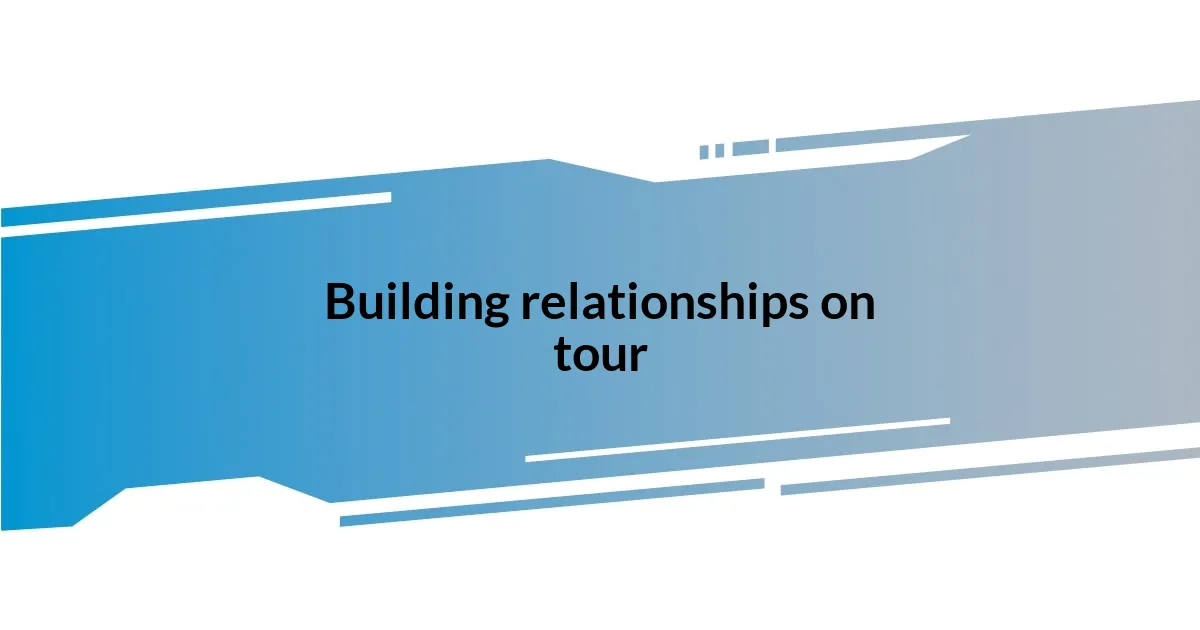
Building relationships on tour
Building relationships on tour is one of the most rewarding aspects of the experience. I remember sitting on a hotel rooftop after a show, sharing laughs and stories with the crew while the city skyline twinkled in the background. It was a simple moment, but connections formed during those late-night chats became the backbone of our tour, turning colleagues into friends and creating a shared sense of purpose.
Trust is another critical element in building relationships while on tour. I once found myself in a foreign city, and my bandmates relied on me to handle logistics for the next gig. I felt the weight of responsibility, but the support from my team made it clear we had each other’s backs. It’s in these high-pressure situations that friendships deepen, as going through challenges together fosters an unspoken bond. Have you ever felt that camaraderie in a tough moment?
Lastly, vulnerability plays a vital role. There were times when I felt exhausted and overwhelmed, and rather than hiding my feelings, I shared them with my band. Their willingness to listen and support me not only lightened my burden, but also strengthened our connection. Sharing personal struggles opens doors for empathy and understanding, and it reminds me that no one is alone on this journey. Building these genuine relationships is what truly makes touring memorable.
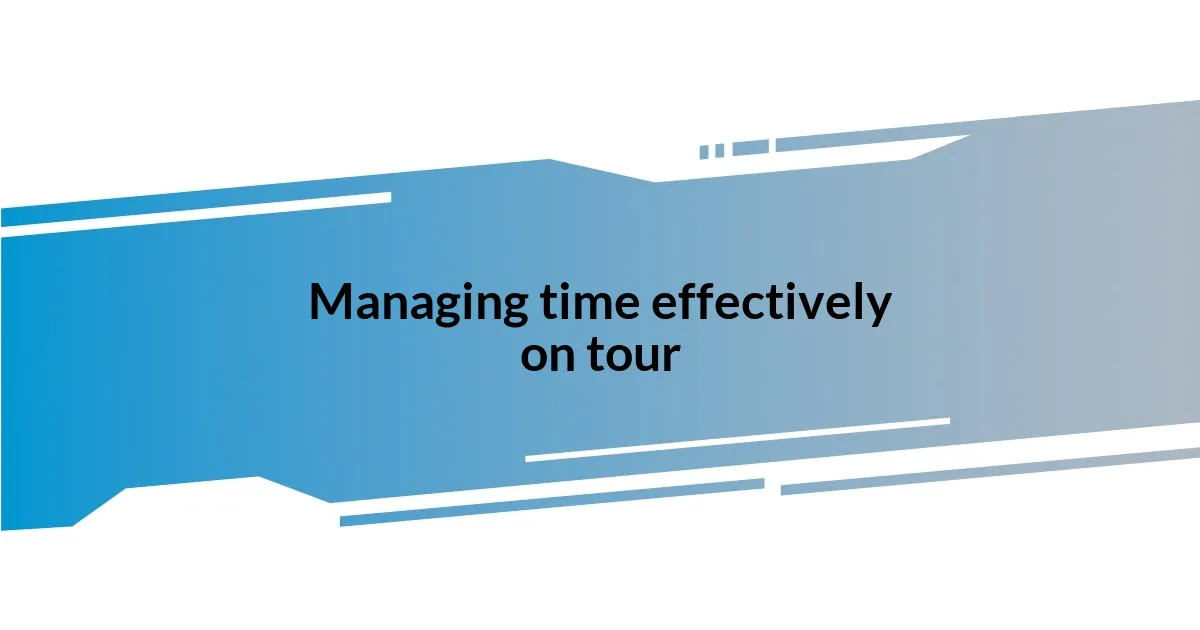
Managing time effectively on tour
Managing time effectively on tour is like crafting a setlist: it requires careful consideration and flexibility. I used to think a strict schedule would keep us organized, but I quickly learned the importance of leaving space for the unexpected. One time, a local traffic jam nearly made us late for soundcheck. Instead of panicking, we adjusted our timeline and found moments to relax, resulting in a more energized performance. Have you ever had to rearrange plans and found that it surprisingly worked out better?
The balance between preparation and spontaneity is vital. I remember days filled with endless travel, and maintaining a solid morning routine became my lifeline. Waking up early to stretch, review the day’s agenda, and enjoy a quiet cup of coffee set a positive tone. It’s those little rituals that anchor me amidst the whirlwind of touring life. What routines do you find help regulate your day-to-day chaos?
Tracking time isn’t just about punctuality; it’s about creating space for rest and creativity. On one tour, we had an off day where I dedicated time to write new songs. By valuing that downtime, I found inspiration that enhanced our overall performance. I’ve realized that managing time effectively means knowing how to pause and let creativity flow, which often breathes new life into our sets. How do you carve out time for inspiration in your hectic life?
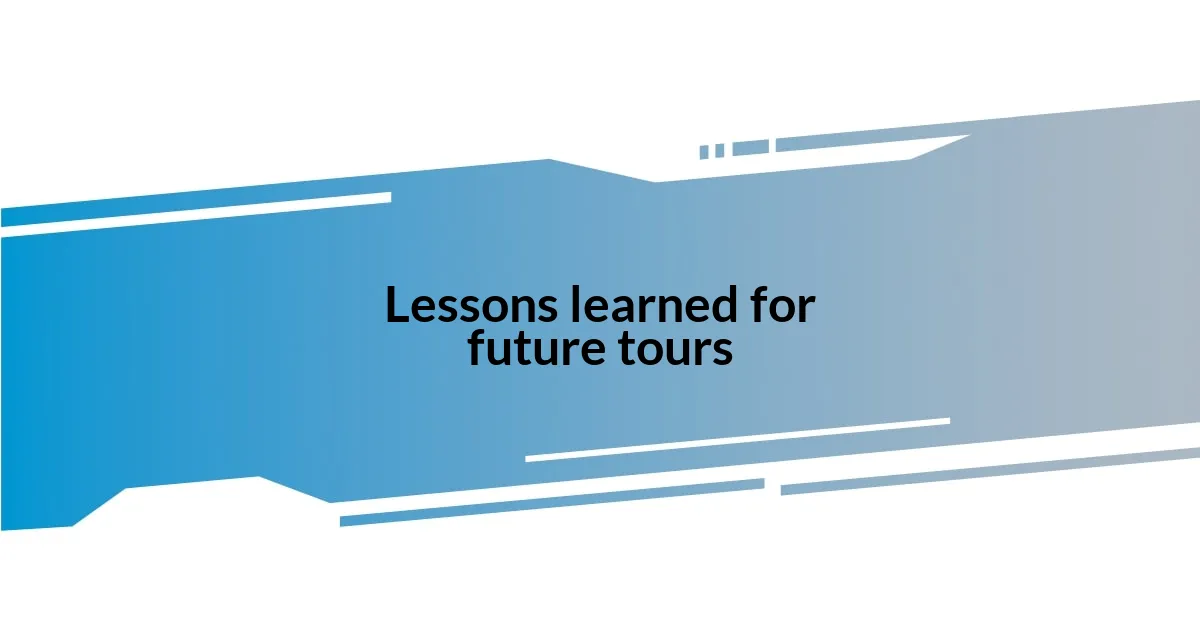
Lessons learned for future tours
One valuable lesson I’ve learned for future tours is to prioritize self-care amidst the chaos. During one particularly grueling tour, I pushed myself to perform every night without much rest, thinking it was what was expected. At one point, exhaustion hit hard, leaving me on the edge of burnout. It was then I realized that taking time for myself—whether it was a quiet morning walk or a moment to meditate—significantly improved my performance and mood. Have you ever noticed how simply stepping back can reinvigorate your passion?
Another crucial insight is the necessity of clear communication with your team. I recall a situation where assumptions led to confusion about the itinerary just before an important gig. The stress it caused was palpable, and I learned that openly discussing expectations and making sure everyone is on the same page would have mitigated the chaos. It’s fascinating how a few minutes dedicated to dialogue can save hours of unnecessary tension, don’t you think?
Lastly, I discovered that embracing adaptability can transform challenges into opportunities. There was a show where, due to unforeseen circumstances, we had to switch up our setlist last minute. Initially, I felt anxious, but diving into the spontaneity created an electric atmosphere that I’ll never forget. I learned that staying flexible not only enhances creativity, but also connects us deeply to our audience. How do you handle unexpected changes in your life?